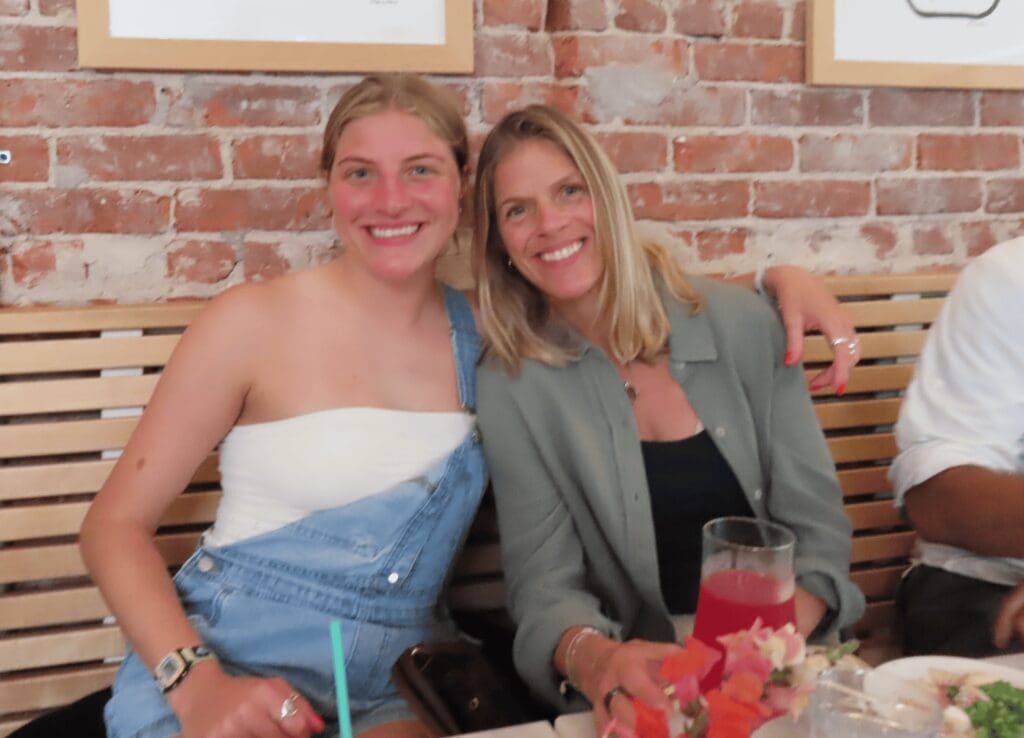Dec. 15, 2021: As more celebrities have come forward to speak about their mental health challenges, the conversation has opened up in our local community as well. That was evident in the lively exchange that took place on the evening of December 2nd, when the public had the rare opportunity to hear CNN journalist S.E. Cupp and local resident Olivia Gravier speak candidly about their struggles with anxiety. In a free flowing discussion called “Opening Up The Conversation,” co-sponsored by The Counseling Center and the Reformed Church of Bronxville, and held in the church’s sanctuary, the two women shared their own stories with the audience and two therapists from The Counseling Center, Virgil Roberson, M. Div., L.P., NCPsyA, Executive Director; and Jennifer Naparstek Klein, Psy. D., Clinical Director. The event was moderated by Kate Milliken Vaughey, a board member of The Center and a deacon at the Reformed Church whose more than fifteen years in media, most recently with a focus on health and well-being, made her well-suited to the role.
Rev. Sam Clover opened with an ecumenical prayer and an affirmation of the help therapy has provided in his own life. As long as he remains in a helping profession, he said, he expects to be seeing a therapist.
Virgil and Jennifer began by agreeing that Covid-19 has impacted people profoundly, exacerbating mental health issues that might have already been present, and affecting certain areas of the population more than others. While some suffered from grief and isolation early on, many are now coping with what Jennifer called “adjustment fatigue,” in which the endless adaptations to Covid have left people exhausted.
S.E. and Olivia each responded to Covid very differently.
As an experienced journalist accustomed to covering tough stories, S.E. in pre-Covid years was already stressed by the divisive political scene. Tensions were heightened, emotions raw, and cultural crises and shifts in politics were coming to a head simultaneously. “Everything I thought I’d known was turned upside down,” she told the audience. “I was personally disoriented, couldn’t figure it out.” Then Covid hit. She mastered the situation by compartmentalizing different aspects of her life until eventually she became overwhelmed, suffered a break-down, and immediately sought help. Virgil pointed out that compartmentalizing is often an effective short-term coping mechanism, sometimes the only way to cope.
Olivia, on the other hand, was only six or seven when she was diagnosed with dyslexia and ADHD and put on medication. As she said, being in an altered state through medication at such a young age meant she didn’t know who she really was. Moving from private schools to Bronxville School in 9th grade was a turning point. She found the culture less friendly to people who were different like she was; self-disparaging thoughts and tremendous self-doubt, even self-hatred, took hold. A semester of college followed by a gap year were mostly, she said, lost to anxiety and nervousness. Covid, then, became a blessing by offering a pause, a chance to reassess.
S.E. noted that Olivia, and others of her generation, are comfortable speaking openly about their mental health issues, and have the language to do so. She added that her own generation, and well known people in media who should know better, sometimes blame people for their mental health struggles. They say stop whining and complaining. “Buck up,” Jennifer supplied; “Get it together,” Virgil added. But many others, often younger people, voice strong support and reassurance. S.E. believes that the more we talk about seeking help for mental health issues, the less stigma will be attached to it.
S.E.’s own breakdown was so severe, it was clear she needed to take action, and she did. She never doubted her ability to get better; she felt overwhelmed and anxious but never suicidal. She received a “ton of compassion,” and largely dismissed the social media trolls. But she needed to let go of her impulse to “fix” the problem. She’s thankful her husband was willing to learn what her new “triggers” were and to refrain from constantly asking how she was doing.
Olivia also dislikes feeling that others are walking on eggshells around her. Her self-awareness is engaging. She is not her anxiety, she told the audience; that’s someone she calls Brian, who lives in her brain, being annoying. At only 21, Olivia is aware of the importance of not casting judgement on people whose life journeys can never be fully known. She’s also learned that each person copes differently. She gives her parents great credit for being “along for the ride,” for allowing her to be herself without pressure or judgement. She suggested that kids tell their parents what they need, and for parents to ask that of their children. Virgil was inspired by how embraced and loved Olivia has felt by her parents.
Jennifer added that parents of children with mental health challenges can experience feelings that are hard to acknowledge; they might blame each other, become defensive, even feel shame. She suggested that communication can be improved if each says: “I can hear it better if you say it this way.”
For both S.E. and Olivia, their therapists have been their anchors. S.E. knows she’s got the right talk therapist when she leaves sessions both relieved to have some pressure removed and exhilarated to try a new technique. A good psychiatrist who can skillfully prescribe medication has also been essential for her.
Olivia knew early on that a therapist who mostly listened wouldn’t work for her; she needed one who talked back. “My therapist challenges the hell out of me,” she said. She also values a psychiatrist who can adjust medications along the way, explaining that as medications have changed and she’s grown up, her medications have needed to be altered.
S.E. stressed that achieving good mental health is a process, a walk not a run. For Olivia there is no finish line. Both have changed therapists more than once as their needs have evolved. By all accounts, each woman has now achieved a place where she is living a full life even as she continues to work hard to maintain her good mental health. S.E. has learned she doesn’t need to hide her anxiety from her six-year-old son or be a perfect mother; she feels free to be a “good enough” mom. But how long she can remain a TV journalist, exposed to constant dissonance, remains an open question. Olivia, meanwhile, has realized she doesn’t need to finish college; she’s found a job she loves, and she accepts her differences. She continues to see a therapist who challenges her.
The Counseling Center thanks S.E. and Olivia for being eager to share their stories. We thank the audience for their compelling questions and active engagement during the Q&A, and we hope to further the conversation about good mental health in future programs of this kind. Both The Counseling Center and the Reformed Church of Bronxville remain committed to furthering the ever-growing awareness of the vital importance of mental health care.
The Counseling Center is a nonprofit group of therapists located in Bronxville and serving its surrounding communities. Learn more at https://counselingcenter.org/. Or, if at any time you feel in need of comfort and support, please call 914-793-3388.


